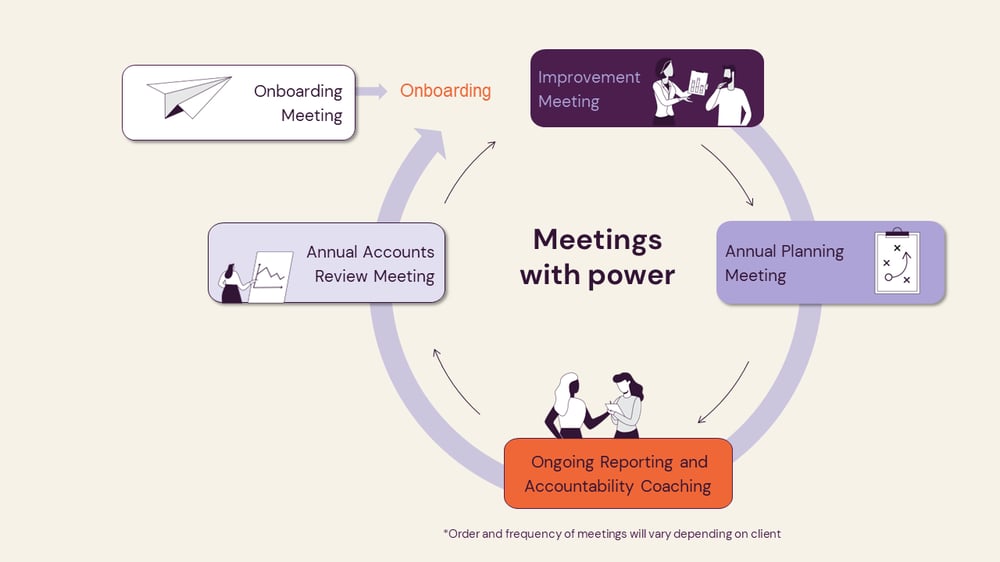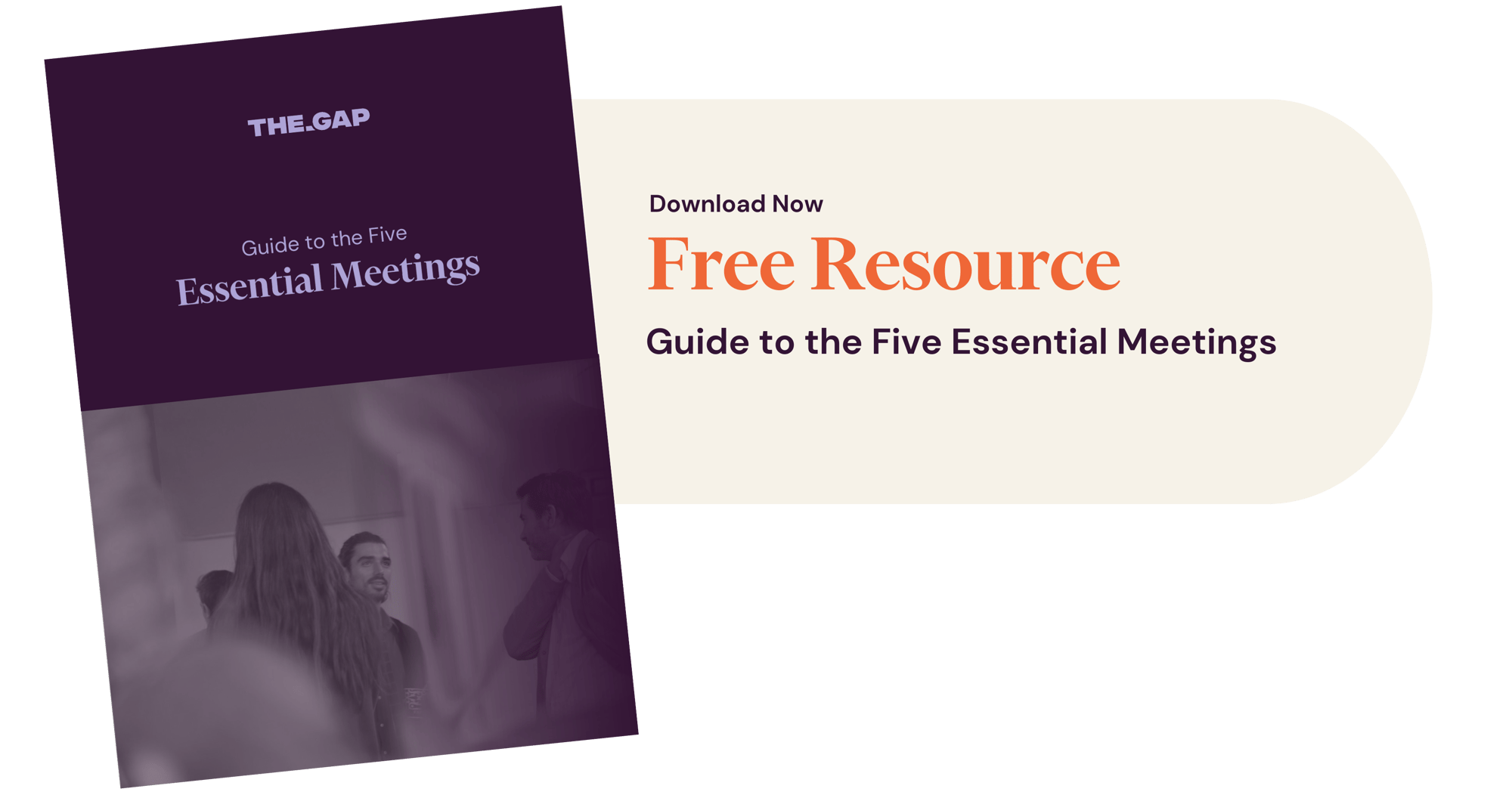Holding Better Meetings
Learning how to hold better meetings is particularly powerful for firms who want to:
- Better engage and support their existing clients
- Improve client retention
- Onboard new clients in a structured way that encourages a high-value relationship
- Better promote all of their services
- Develop meeting rhythms that maximise monthly recurring revenue
We’ve all been there. You have a client meeting to review the Annual Accounts coming up. You get swept up in the day and don’t spend time planning the meeting. That’s doing an injustice to your client as well as to your firm.
But before we even get into how to conduct better client meetings, here’s an important question for you.
We believe there are five essential meetings you should deliver to better support your clients, while at the same time positioning and selling your Business Advisory services. These five meetings are:

1. The Onboarding Meeting
The onboarding meeting is your first meeting with a prospective client.
This should be a complimentary meeting that is jam packed with value.
Objectives include:
- To establish their business and personal goals
- To discuss their problems and challenges
- To establish how you can work with them to overcome those challenges
- To position your services, both compliance and Business Advisory
- To figure out if you’re the right fit for each other
- To gather the information you’ll need before you formally engage your client
It’s important that you position the value of the Proactive Accounting Meeting well. Add this to your website and position the value of this meeting in your email and other communications.
2. The Improvement Meeting
The Improvement Meeting is the easiest way for accounting firms to demonstrate the value of your ongoing advisory services.
It's a one-off meeting that's typically 90 minutes long and can be delivered to existing or future clients.
The objectives are simple; to identify 1-2 specific improvement opportunities the client can implement to improve their business in some way. It's important to hone in on an area of improvement most relevant to your client. We find that Cashflow and Profit Improvement or Risk Management the most universal topics.
The Cashflow & Profit Improvement Meeting uses our tool to teach the client their Cash Conversion Cycle and identify strategies to improve cashflow. Then, work through the profit drivers to establish strategies to increase profit.
The Risk Management Meeting helps clients identify areas of risk in their business, assess the likelihood and consequence of the risk occurring, and take action to mitigate those risks.
The purpose of this meeting is to establish the areas of improvement that will have the biggest impact on the client and discuss tactics and actions that they can implement. You will not be able to provide all the answers in one meeting but you can positions the value of ongoing accountability coaching to ensure the improvements are realised!
To view our entire Improvement Meeting delivery process, book a demo here, or take a trial of The Gap.
3. The Annual Accounts Review Meeting (AAR)
We don’t need to labour the point here. Most firms run this meeting every year for most clients. If you don’t, you’re missing out on a huge opportunity to help clients, and arguably, your clients aren’t getting the support they deserve.
We think this meeting has a dual purpose, obviously we need to review the draft Annual Accounts and make sure clients understand their tax position, but we should also use the second half of this meeting to look at forward facing opportunities - after all, you'll have seen plenty of these when reviewing their accounts.
This meeting should:
- Be structured!
- Improve clients’ understanding of their reports
- Enable you to demonstrate the value you’ve provided to them in the past year
- Identify opportunities to work together so that they achieve their business and personal goals
If you don’t run an Annual Accounts Review meeting with, at the very least, your ‘A’ clients, it’s never too late to position the value in your online and in-person communications. Be bold! Guarantee the value from that meeting at the outset. If you don’t add the value – no fee!
.png)
4. The Monthly Momentum Call
This is a 15-minute meeting to ensure the client has read and understood their monthly Management Reports. Keeping this meeting phone or online based ensures the meeting time doesn’t stretch to an hour. The objectives are simple:
- To ensure your client understands their Management Reports
- To identify opportunities to improve results
- To establish any actions the client should take in the next month, demonstrating the value of planning and accountability
It’s useful to have a process for how you’ll run the call. In the portal, we provide a Momentum Call Script you can use as a guideline.
5. The Accountability Coaching Meeting
The accountability or coaching meeting may be quarterly, monthly, or even weekly, depending on your clients’ situation and needs. For example, a mature business may be best suited to a quarterly meeting, whereas a start-up business may need a more frequent meeting rhythm.
You'll provide a sounding board to discuss ideas prior to implementation and identify and help solve the client’s burning issues. You'll also help your client keep their Business Plan alive by resetting their quarterly goals and actions.
Pre-work should be completed by everyone attending any one of the above meetings. This ensures attendees are engaged in the process and have some understanding of what they want to achieve from the meeting.
Pre-work also allows you, as facilitator, to prepare for the session, identify any misalignment between business owners, and prevents the session from becoming a ‘meeting of discovery’. Pre-work adds depth and clarity to any meeting, as everyone knows the purpose of the meeting, the issues that need to be addressed, and therefore the desired outcomes.
If pre-work has not been submitted at least 48 hours before the session, contact your client and reschedule the meeting. That’s an effective lesson in accountability!
/Annual%20Accounts%20Review%20Meeting%20prework%20Screenshot.png)
Your Agenda
All meetings need a clear agenda to refer to at the beginning, during, and after the meeting to ensure objectives are met. If the client starts to go off track, seeking specific advice, use the agenda to bring them back to the purpose of the meeting and gain conceptual agreement to schedule an additional meeting to discuss and address the issue. In Gap content, agendas are clearly defined within a service's Delivery Notes.
Your Delivery Process
Use Delivery Notes* to guide the conversation. They provide estimated timings for meeting segments, questions you’ll likely ask, and reports and information you’ll need to bring to the meeting to ensure the outcomes are achieved.
*Delivery Notes: provide clear guidelines on how to deliver the meeting, with talking points and questions to ask the client as appropriate.
- These are extremely comprehensive; we recommend you practise speaking to these several times to become comfortable before your first client session
- These are not designed for you to recite word for word; adapt to reflect your own speaking style
- These contain a suggested time allocation to ensure you complete the meeting within the prescribed time
- Ask questions to engage attendees in the process.
- Identify what your client is looking to achieve and why.
- Clarify the actions needed to be taken, by whom, and by when.
- Reinforce their objectives, outcomes, and the value gained from the meeting.
- BAMFAM - Book A Meeting From A Meeting - to keep them accountable for the actions they say they’ll take (and to add to your recurring revenues streams).
Meeting Minutes
Meeting Minutes should be completed during each meeting and should be visible to attendees throughout the session so they can contribute to actions and completion dates. Check in frequently to ensure they’re an accurate reflection of what has been discussed and agreed to ‘in session’. Record any additional services required with a due date and the fee quoted. Meeting Minutes should be emailed to the client immediatel following the meeting. You’re their accountability framework.
Getting Sales Outcomes From Your Client Meetings
You don’t want to come across as a product pusher. You want to come across as someone who cares and genuinely wants to help their clients succeed. When you’re positioning Business Advisory services, it doesn’t work to tell them what to do. They may have tried some of these things before and failed. To sell Business Advisory services, ironically you need to take off your ‘Advisor’ hat and put on your ‘Coach’ hat. You need to ask and not tell.
Ask, Don't Tell.png?width=750&height=354&name=Ask%20dont%20tell%2c%20rebranded%2c%20no%20title%20(1).png)
For example, the Complimentary Client Review is a subtle sales process that unlocks business potential. You’re simply helping your clients get the three freedoms – Time, Mind and Financial Freedom.
Start by asking simple questions about how successful the business has been at delivering to the owners what they want (more time away, less worry and stress, or more profit or cash). Keep asking thoughtful questions about how the current position could be improved. You’ll recognise the point of client engagement. That’s when you stop asking and start answering, because now, it’s your client who is asking the questions.
This is a very powerful mindset for accountants to grasp. As advisors, we’re used to telling, NOT asking! Check out our ‘Ask don’t tell Video’ here for a great example of how to pursue a line of questioning to get the outcome you need. The key is to Stop listening to reply – listen to understand.
If you’re fascinated with the word ‘sales’ (or if you’re afraid it) have a read of our detailed ‘Selling for Accountants’ resource.
Gaining Conceptual Agreement
If the outcome of a meeting is a proposal for services, you must gain conceptual agreement before sending a proposal. This ensures your client or prospect understands:
- The objectives of the work you’re doing to do (the problems the service will solve).
- How you’ll measure the success of the work (the noticeable changes to their business).
- The value the service will deliver, e.g. a $10,000 cashflow improvement (financial freedom), ability to reduce hours from 60 to 40 per week (time freedom), or peace of mind that the tax position will withstand scrutiny (mind freedom).
- The options for how you can deliver this value, e.g., Business Plan only or Business Plan with coaching.
- When and how you’ll deliver the service.
- How much it will cost.
Sending a proposal without first gaining conceptual agreement will likely result in a lower acceptance rate.
And finally, a word on scope stretch. More client meetings is the goal - more scope stretch isn’t! Don’t give away your value at meetings. Stop, pause, and price that extra job. Read our Guide to Minimising Scope Stretch.
And now, for the last words on better meetings…
We’ve created a short guide for you to share with your Partners and Senior Accountants Your Guide to the Five Essential Meetings. Enjoy!
And, for a tour of our comprehensive meeting delivery tools and processes contact the sales team or take a 30-day trial.


.png?width=2000&height=522&name=Guide%20to%20the%20Five%20%20Essential%20Meetings%20-%20DOWNLOAD%20-%20Option%204%20(1).png)